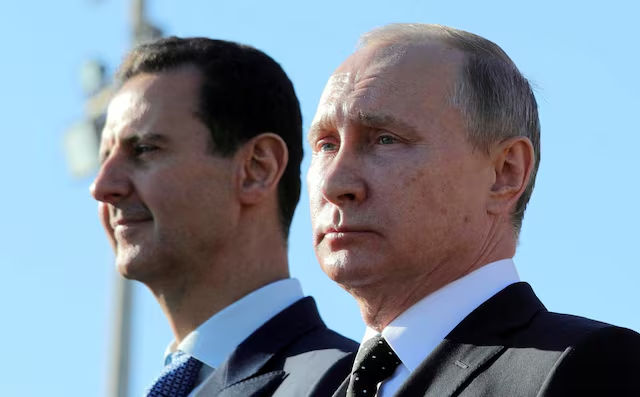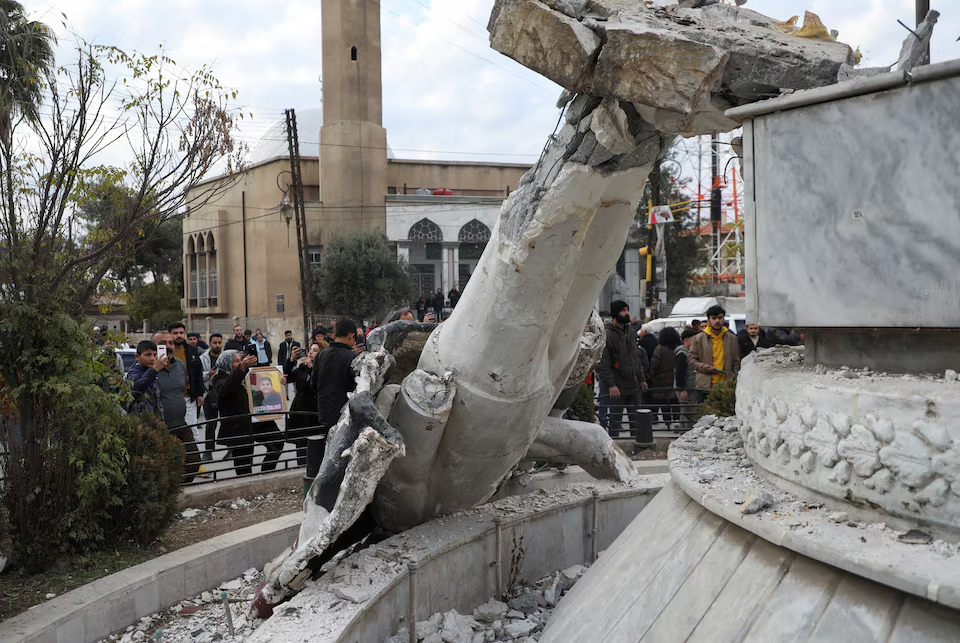People stand near a damaged statue of former Syrian president Hafez al-Assad after Syrian rebels announced that they have ousted President Bashar al-Assad, in Qamishli, Syria December 8, 2024
Damascus, Dec 9 — Syrians awakened on Monday to a hopeful uncertain future, after rebels seized the capital Damascus and President Bashar al-Assad fled to Russia, ending a 13-year civil war and more than 50 years of his family’s brutal rule.
The lightning advance of a militia alliance spearheaded by Hayat al-Tahrir al-Sham (HTS), a former al-Qaeda affiliate, marked one of the biggest turning points for the Middle East in generations. Assad’s fall wiped out a bastion from which Iran and Russia exercised influence across the Arab world.
Moscow gave asylum to Assad and his family, Russian media reported and Mikhail Ulyanov, Russia’s ambassador to international organizations in Vienna, said on his Telegram channel on Sunday.

Russian President Vladimir Putin (R) and Syrian President Bashar al-Assad visit the Hmeymim air base in Latakia Province, Syria December 11, 2017.
Russia’s Foreign Ministry said earlier that Assad had left Syria and given orders for a peaceful transfer of power, after rebel fighters raced into Damascus unopposed on Sunday, ending nearly six decades of his family’s iron-fisted rule.
“Syrian President Assad of Syria and members of his family have arrived in Moscow. Russia has granted them asylum on humanitarian grounds,” the privately-owned Interfax news agency and state media quoted the unnamed Kremlin source as saying.
International governments welcomed the end of the Assads’ autocratic government, as they sought to take stock of a new-look Middle East.
U.S. President Joe Biden said Syria is in a period of risk and uncertainty, and it is the first time in years that neither Russia, Iran nor the Hezbollah militant organization held an influential role there.
HTS is still designated as a terrorist group by the U.S., Turkey and the United Nations, although it has spent years trying to soften its image to reassure international governments and minority groups within Syria.
Japan’s chief cabinet secretary, Yoshimasa Hayashi, said on Monday Tokyo was paying close attention to developments in Syria.
The rebels face a monumental task of rebuilding and running a country after a war that left hundreds of thousands dead, cities pounded to dust and an economy hollowed by global sanctions. Syria will need billions of dollars in aid.
“A new history, my brothers, is being written in the entire region after this great victory,” said Ahmed al-Sharaa, better known as Abu Mohammed al-Golani, the head of HTS.
Speaking to a huge crowd on Sunday at Damascus’ Umayyad Mosque, a place of enormous religious significance, Golani said with hard work Syria would be “a beacon for the Islamic nation.”
The Assad police state was known as one of the harshest in the Middle East with hundreds of thousands of political prisoners held in horrifying conditions.
On Sunday, elated but often confused inmates poured out of jails. Reunited families wept in joy. Newly freed prisoners were filmed running through the Damascus streets holding up their hands to show how many years they had been in prison.
The White Helmets rescue organization said it had dispatched emergency teams to search for hidden underground cells still believed to hold detainees.
With a curfew declared by the rebels, Damascus was calm overnight, with roads leading into the city mostly empty. One shopping centre had been looted on Sunday, and some people rampaged inside Assad’s presidential place, leaving carrying furniture.
The rebel coalition said it was working to complete the transfer of power to a transitional governing body with executive powers, referring to building “a Syria together.”
Golani is a Sunni Muslim, which is the majority in Syria, but the country is home to a wide range of religious sects, including Christians and Assad’s fellow Alawites, an offshoot of Shi’ite Islam.



